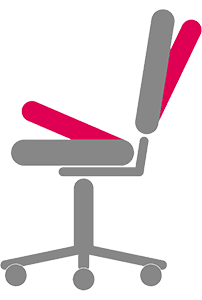Office Chair Mechanisms Info and Benefits
Here is your comprehensive guide to finding your way around the many options of mechanisms and adjustments available and the benefits that they bring to enable you to choose your perfect office chair.

You can adjust the height of the seat but not the angle of the back rest i.e. this mechanism does not allow the chair to be reclined.

You can adjust the height of the seat and either adjust the angle of the back or enable the permanent contact back. The seat cannot be tilted.

You can adjust the height of the seat, angle of the back, angle of the seat and, depending on the chair, enable the permanent contact floating back. Usually the back and seat will tilt at a ratio of 2:1. The tension of the mechanisms can be adjusted through the torsion control knob.

You can recline in this chair but the back and seat will stay at a fixed angle, lockable by a lever. You can adjust the recline tension through a torsion control knob.

The seat angle will change in proportion to the back angle at a ratio of 1:2. The seat and back can be locked into between 3 and 5 positions, depending on the chair. You can adjust the seat height and the recline tension can be adjusted through a torsion control knob.

You can adjust the height of the seat and the back can be reclined and locked into between 3 and 5 positions. The front located pivot point allows your feet to easier remain in contact with the floor when reclining.

Gives ability to move the seat back up and down independently of other functions - ideal where a chair us used by different people as each user can easily and quickly customize the back height to suit their needs.

The back of the chair should allow the 'S' shape of the spinal column to be formed naturally and be supported. A comfortable back rest will prevent slumping and reduce stress on the spine and pelvis.

A seat sliding feature encourages better back support by ensuring the back of the chair is in contact with the correct part of your back. It also helps relieves pressure from the back of the knees by helping spread the weight over the full surface area of the seat. A seat slide mechanism also automatically makes the chair more adjustable to different peoples needs, making chairs with a seat slide great for call centres and hot desking which involve multiple people of varying shapes and sizes using the same chair over the course of a day.
To make sure you are getting the most out of your chair, follow our simple advice:
- The chair should allow the user to move easily and freely; we recommend that you leave the chair unlocked to make full use of the chair's movement whether on the phone, reading or reaching.
- When typing or working at the computer, the ideal seat angle would be tipped slightly forward to encourage an open posture.
- If you have been sitting for a while, move your feet around to stimulate the blood flow, and try not to slouch.
- If you are going to use another chair, make the effort to adjust it to ensure you are receiving maximum support before commencing work.
